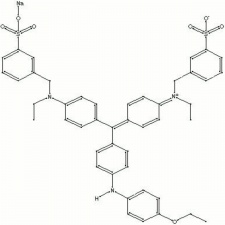Difference between revisions of "Brilliant Blue R-250"
Jump to navigation
Jump to search
(username removed) |
|||
| (3 intermediate revisions by 2 users not shown) | |||
| Line 1: | Line 1: | ||
== Description == | == Description == | ||
| − | A bright blue biological stain. Brilliant Blue R-250 is a [ | + | A bright blue biological stain. Brilliant Blue R-250 is a [[diazo dye]] that has been used for staining [[protein|proteins]] in paint cross sections and gel [[electrophoresis]]. It has also been used as a textile dye and wood stain. |
== Synonyms and Related Terms == | == Synonyms and Related Terms == | ||
| Line 8: | Line 8: | ||
[[[SliderGallery rightalign|brilliant blue r-250.jpg~Chemical structure]]] | [[[SliderGallery rightalign|brilliant blue r-250.jpg~Chemical structure]]] | ||
| + | == Risks == | ||
| − | == | + | * Contact may cause irritation. |
| + | * ThermoFiosher: [https://www.fishersci.com/store/msds?partNumber=BP10125&productDescription=BRILLIANT+BLUE+R-250+25G&vendorId=VN00033897&countryCode=US&language=en SDS] | ||
| + | |||
| + | ==Physical and Chemical Properties== | ||
| − | Soluble in water, ethanol Insoluble in vegetable oils. | + | * Soluble in water, ethanol Insoluble in vegetable oils. |
| − | + | * Maximum absorption wavelength = 585 nm. | |
| − | Maximum absorption wavelength = 585 nm. | ||
{| class="wikitable" | {| class="wikitable" | ||
| Line 27: | Line 30: | ||
|} | |} | ||
| − | == | + | ==Resources and Citations== |
| − | |||
| − | |||
| − | |||
| − | |||
| − | |||
| − | |||
| − | + | * R.Wolbers, G.Landry, "The Use of Direct Reactive Fluorescent Dyes for the Characterization of Binding Media in Cross Sectional Examinations" in Preprints of the AIC Meeting in Vancouver, 1987. | |
| − | + | * M.Johnson, E.Packard, "Methods Used for Identification of Binding Media in Italian paintings of the 15th and 16th Centuries" ''Studies in Conservation'' 16:145-164, 1971. | |
* Richard C. Wolbers, Nanette T. Sterman, Chris Stavroudis, ''Notes for Workshop on New Methods in the Cleaning of Paintings'', J.Paul Getty Trust, Los Angeles, 1990 | * Richard C. Wolbers, Nanette T. Sterman, Chris Stavroudis, ''Notes for Workshop on New Methods in the Cleaning of Paintings'', J.Paul Getty Trust, Los Angeles, 1990 | ||
Latest revision as of 09:57, 10 May 2022
Description
A bright blue biological stain. Brilliant Blue R-250 is a Diazo dye that has been used for staining proteins in paint cross sections and gel Electrophoresis. It has also been used as a textile dye and wood stain.
Synonyms and Related Terms
Acid Blue 83; CI 42660; Brillantblau (Deut.); Brilliant Blue R250; Brilliant Blue R; Coomassie R-250;
Risks
- Contact may cause irritation.
- ThermoFiosher: SDS
Physical and Chemical Properties
- Soluble in water, ethanol Insoluble in vegetable oils.
- Maximum absorption wavelength = 585 nm.
| Composition | C45H45N3O7S.Na |
|---|---|
| CAS | 6104-59-2 |
| Molecular Weight | mol. wt. = 825.99 |
Resources and Citations
- R.Wolbers, G.Landry, "The Use of Direct Reactive Fluorescent Dyes for the Characterization of Binding Media in Cross Sectional Examinations" in Preprints of the AIC Meeting in Vancouver, 1987.
- M.Johnson, E.Packard, "Methods Used for Identification of Binding Media in Italian paintings of the 15th and 16th Centuries" Studies in Conservation 16:145-164, 1971.
- Richard C. Wolbers, Nanette T. Sterman, Chris Stavroudis, Notes for Workshop on New Methods in the Cleaning of Paintings, J.Paul Getty Trust, Los Angeles, 1990
- Aldrich Chemical Catalog
- Sigma Dyes, Stains and Natural Pigments, Infrared Library, Nicolet, 1991-1995
